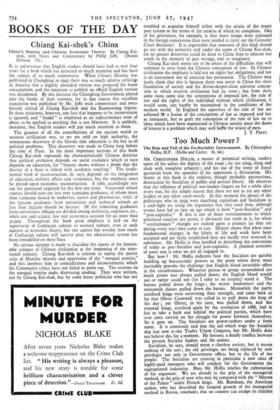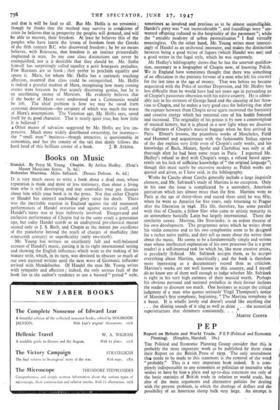Too Much Power ?
MR. CHRISTOPHER HOLLIS, a master of polemical writing, confers upon all his sallies the dignity of the essay ; he can sting, slang and slash with complete urbanity ; and his use of the irony of literal quotation from the speeches of his opponents is devastating. His theme in this book is the reckless, though probably unconscious, destruction by Socialists of public and private liberty. He observes that the influence of political war-leaders lingers on for a while after every war, for the simple reason that there are not as yet any other leaders or any other catch-words. At this moment the ghosts of the politicians who in 1939 were matching capitalism and Socialism in a cock-fight are using the arguments that they used then, although events have led us into an age which is both " post-Socialist " and "post-capitalist." If this is one of those overstatements to which polemical essayists are prone, it obviously has truth in it, for when " revolutionary " changes are rushed upon a country (as they are during every war) they come to stay. History shows that when once fundamental changes in the fabric of life and work have been accepted and are fairly established they are hardly ever reversed in substance. Mr. Hollis is thus justified in describing the convention of today as post-Socialist and post-capitalist. A planned economy of, some sort is what we are all engaged in.
But how ? Mr. H011is indicates how the Socialists are quickly building up bureaucratic powers to the point where these must inevitably provoke the challenge that English blood invariably offers in the circumstances. Whatever person or group accumulated too much power was always pulled down; the English blood would not or rather could not (for I refer to an instinct) stand it. The barons pulled down the kings ; the minor landowners and the mercantile classes pulled down the barons. Meanwhile the partly sterilised kings were recovering their -strength, and came back sO far that Oliver Cromwell was called in to pull down the king of his day; yet Oliver, in his turn, was pulled down, and the restored kings, sterilised again by the revolution of 1688, had it last to take a back seat behind the political parties, which have ever since carried on the struggle for power between themselves. So it goes on. The Socialists are power-seekers under a fresh name. It is commonly said that the tail which wags' the Socialist dog just now is -the Trades Union Congress, but Mr. Hollis does not believe this for a moment. He foresees a deadly conflict between the present Socialist leaders and the unions.
Socialism, he says, should mean a classless society, but it means nothing of the sort ; the old privileges are being replaced by new privileges not only in Government offices but in the life of the people. The Socialists are creating in particular a new class ot highly-paid managers who will conduct for the Government the expropriated industries. Here Mr. Hollis reaches the culmination of his argument. We are already in the grip of the managerial method, in the grip of men who may bg compared with the "Mayors of the Palace" under French kings. Mr. Burnham, the American author, who has described the fungoid growth of the managerial method in Russia, concludes that no country can escape its clutches and that it will be fatal to all. But Mr. Hollis is no pessimist ; though he thinks that the method may survive in conditions of crisis he believes that in prosperity the peoples will demand, and will be able to recover, their freedom. At least he believes this of the peoples who have learnt the lesson of freedom from the Greeks of the fifth century B.C. who discovered freedom ; he by no means believes, with Rousseau, that freedom is an instinct primordially implanted in man. In any case class distinctions can never be extinguished, nor is it desirable that they should be. Mr. Stalin himself has surprisingly called equality a petit bourgeois prejudice. Few Russians are so frank ; they prefer to proclaim equality and spurn it. Marx, for whom Mr. Hollis has a curiously touching affection, assumed that class could be extinguished. Mr. Hollis is indeed a grateful student of Marx, recognising how many coming events were foreseen by that acutely discerning genius, but he is an unrelenting enemy of Marxism. He evidently believes that if the books of Marx were understood not a Communist would be left. The chief problem is how we may be saved from economic determinism—the certainty of which was much the worst of Marx's assumptions. The Victorian age, Mr. Hollis says, saved itself by its good character. That is nearly quite true, but how little it is believed !
• Other means of salvation suggested by Mr. Hollis are less im- pressive. Much more widely distributed ownership, for instance— the "small man" business—though attractive, is questionable in economics, and has the tenuity of the tail that dimly follows the
hard head of this brilliant corner of a book. J. B. ATKINS.



































 Previous page
Previous page